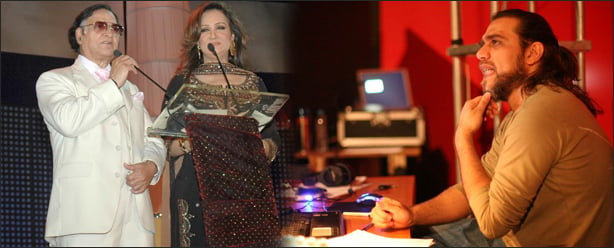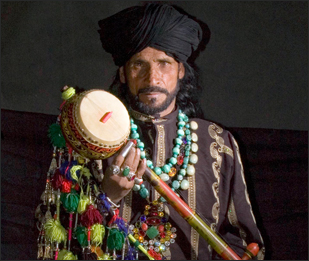|
|
| |
instep
comment
Bring it back, carry it forward
In these divisive, hard times it is more important to come together
as one than ever before. Only big dreams can chase away our cultural
nightmare.
By Muniba Kamal |
| |
 |
| |
Enough
talk of global recession and people painting a scenario of gloom
and misery all round. Enough of everyone complaining about business
going down: not enough clothes being sold and hardly any music coming
out. The prophets of doom need to shut their traps and focus on
the positive instead. Things have never been so bright for in terms
of platforms in Pakistan and the innovation that one is seeing in
terms of bringing our talent and more importantly our traditions
and our living legends back into the spotlight.
I must admit I had lost my mojo thanks to the naysayers. The general
mood of the entertainment industry was down and out after the Mumbai
attack and the political upheaval that has lasted now in Pakistan
for years now. But come to think of it now, it's been that way pretty
much since I was born… since the creation of Pakistan even.
Yet despite from the headline grabbing power play, the protests,
the riots and the bomb blasts, there are other things that have
carried on and must carry on. There is so much greatness in this
nation that is overlooked in favour of our problems and now there
are platforms being created that are bringing it out. They are more
pleasant to think about than the latest stupidity of our 'leaders'.
The high point that brought me out of my cynical stupor was meeting
Saeen Zahoor and Sohail Rana within a 24 hour gap. I met THE Saeen
(he is the first amongst un-equals) at the rehearsals for Coke Studio
and Sohail Rana at the Jang Building where he was busy finaling
details for a musical night titled Aaj Jaane Ki Zid Na Karo, A Tribute
to Sohail Rana where he would conduct the music.
Saeen Zahoor, one had seen before at the Sufi Festival organized
by the Peerzadas in Karachi, where he was hypnotic swirling on stage
while striking just the right notes in that mellifluous voice that
tugs at the chords of the heart. At Coke Studio, up close and personal,
he is even more iconic. With that weather beaten, chiselled face,
the kindest eyes and a dignity to his demeanour, wearing his robes
and turban with grace, an ektara in hand, Saeen Zahoor is enigmatic.
He talks in dulcet Punjabi and though he cannot read or write, he
is a philosopher as all dervishes are. His speech is punctuated
by Sufic kalam of the great saints particularly Baba Bulleh Shah.
He has been around and learned from life.
Perhaps the most surprising thing seeing Saeen Zahoor at the high
tech Coke Studio was how savvy the man is. Calling backing vocalists
Saba and Natasha as Beti at times and Bachi at others, he told them
exactly what he wanted them to sing and where. Comfortable with
the mike, with headphones in his ear and looking every inch at home
in the studio, Saeen was nevertheless not of this world, that is
to say he was other-worldly.
What sets him apart from the stereotypical pop star is that while
he may go and perform all over the world, which he has, but nothing
holds him back from playing at the shrine circuit. He does not speak
English or Urdu, and he has no desire to do so. He will never modernize
his image let alone his lifestyle. He is who he is and he is incredibly
sophisticated, even though he doesn't know how to read or write.
And he has made it, beyond the dreams of most pop stars and rockers
of our time.
Saeen Zahoor's fan following is massive. Not only have people in
cities heard of him, he is a folk legend, all over rural Pakistan.
For the awam, (most of Pakistan's people) who do not watch music
channels, he is the biggest star. Musicians who complain of the
lack of a circuits should take note. Saeen Zahoor has played his
music circuit for well over 50 years now and he carries on doing
so. This is one musician who has not stopped playing live because
of the security situation. He's been giving concerts all his life
and continues to do so. If only our rebel rock stars and pop stars
had such gumption.
Had our musicians had the ability to chase their vision and not
the big bucks offered by corporations and the glory of performing
overseas and across the border, our music scene would be more vibrant
than it is now. Short cuts always lead to massive losses in the
long run. |
| |
One
man who has never taken a short cut is Sohail Rana. It was
a pleasure meeting him, bringing back childhood memories of
watching Sang Sang Chalein and singing along to 'Dosti Aisa
Nata Jo Sonay Se Bhi Mehnga' and 'Sooraj Karay Salam'. For
any child growing up in the 80s, that show was an integral
part of life. Researching Sohail Rana, I came across those
songs again on the website www.sohailrana.com (set up and
run by one of his fans) and found that I could still sing
along. Looking back, one marvels at this initiative as music
as education and then when one discovered that that is what
he turned to when the golden era of Pakistani films was drawing
to a close after giving us evergreen numbers like 'Akele Na
Jana' and 'Ko Ko Korina' the respect for him grew tenfold
more! |
 |
|
| |
In person Sohail Rana is lovely, preferring to speak the most eloquently
in Urdu even though he is fluent in English. Though he migrated
to Canada some 14 years ago, his love of Pakistan is evident in
the language he speaks and his understanding of music and all things
cultural. This is a man who can speak about things he's done and
can cross refernce both Bulleh Shah and an O. Henry short story
in the same sentence drawing paralells between all three. He speaks
about art with passion, and always in terms of what it can do to
bring people together, to pierce our collective consciousness, to
carry our traditions forward. It's refreshing to meet him in this
era of musicians full of talks of deals, corporate sponsorships
and dreams of superstardom.
That is what our scene has become unfortunately, every man for himself.
And that was evident at the recording of the tribute to Sohail Rana
where some of the biggest stars performed sand with chits of papers
in their hand. On inquiring why they were doing so, one was told
that they were too busy to rehearse. When egos become so big it
is is only natural that the scene will burst, but not at the seams
as it should. It will turn inwards and implode within itself. The
greatest artistic endeavours are all about collaboration. After
all, if actors of the stature of Helen Mirren and musicians of the
calibre of A.R. Rahman rehearse, then shouldn't our musicians be
taking a leaf out of their books? Shouldn't they be looking as much,
if not more, at the quality of what they are doing than the quantity
of what they are earning?
The only recent light in the music scene has been lit by Rohail
Hyatt and his vision for Coke Studio. This is one platform where
musicians don't have any option but to rehearse, or else nothing
doing – you are out of the show! Rohail has created a platform
for music where the leading lights of the industry come and perform
together as one. And he has done it with such panache that the biggest
stars want to be a part of it. What is even more commendable is
that Rohail himself remains behind the scenes. When you see Coke
Studio you don't see him anywhere apart from the 'Making of…'
segments. He is NOT the star, he is the producer and he acts like
one. He has transcended Rohail Hyatt of Vital Signs and Rohail Hyatt
CEO of Pyramid to become what he is today. And strangely enough,
'Pa' Hyatt, as they call him at the studio is a combination of both
his previous avtars. That's reinvention, not of the cult of a person
ala Madonna, but of the music scene at large. And that is what Pakistan
needs right now.
Reinvention is what Sohail Rana has consistently specialized in
and that is what Rohail Hyatt is doing. One thing that ties them
both together is their love and understanding of folk music and
its power. One of the projects Sohail Rana did in the 1960s was
a record called Khyber Mail, the musical journey of a train that
began in Sindh, went through Balochistan made its way up the Punjab
and ended up at the mountainous heights of the NWFP. Sohail Rana
is proud of the fact that copies of the record are being auctioned
on E-bay till today. He is a great believer of the power of our
music. And today with Coke Studio, Rohail Hyatt is pursuing a similar
train of thought. He's bringing folk back and taking it forward
in brand new packaging. He's taking the same nostalgic beats that
are so much a part of our collective consciousness and wrapping
them in a more sophisticated sound that is bigger than what any
one individual musician or band can do.
And this brings me back to Saeen Zahoor who represents the primal
spirit that moves us all. 'Allah Hoo' – it's an ancient strain
that stirs something within, not just in us but in the world at
large. Saeen was voted Best Voice and so he made it to the BBC World
Music Awards in 2006. All his life, he has been chasing something
bigger than himself, not caring where it takes him, remaining the
same. While it isn't easy for urbanites to do the same, there are
lessons to be learnt from the way he is.
Your dream of the future has to be bigger than you or else each
individual will stand alone and the music scene in Pakistan will
be more bereft and lonely for it. So come together… and let
the good times roll!
|
| |
|

